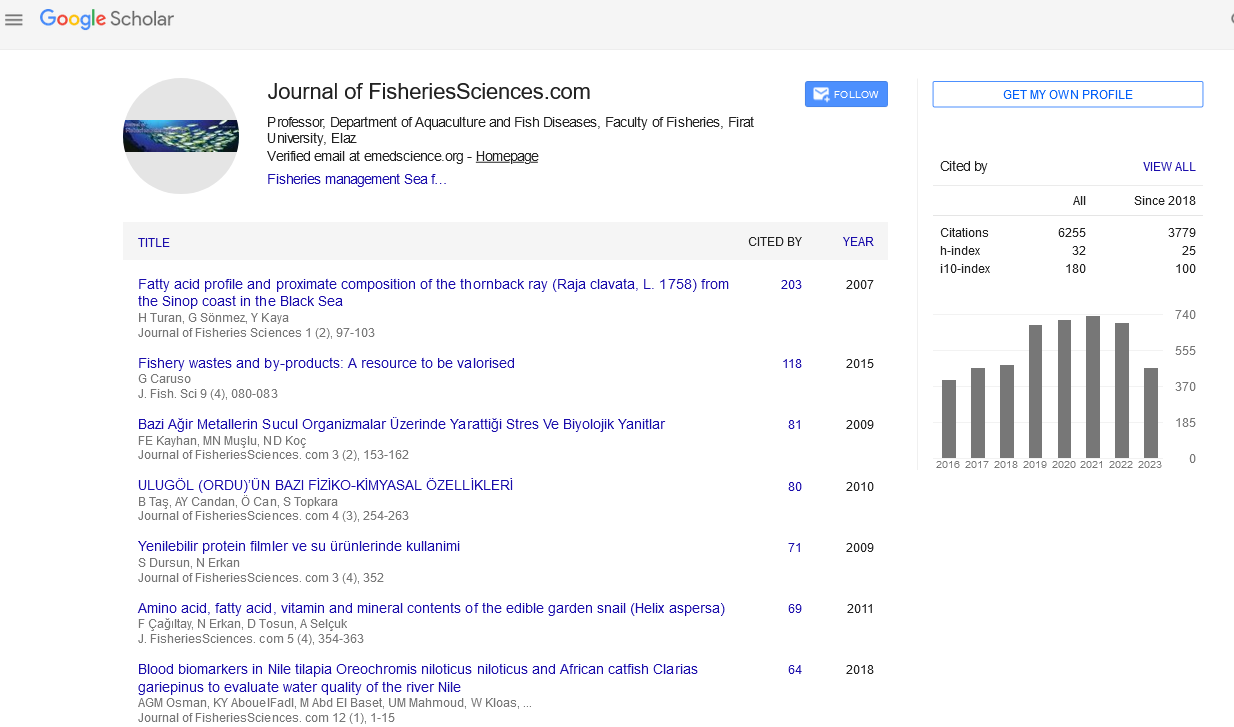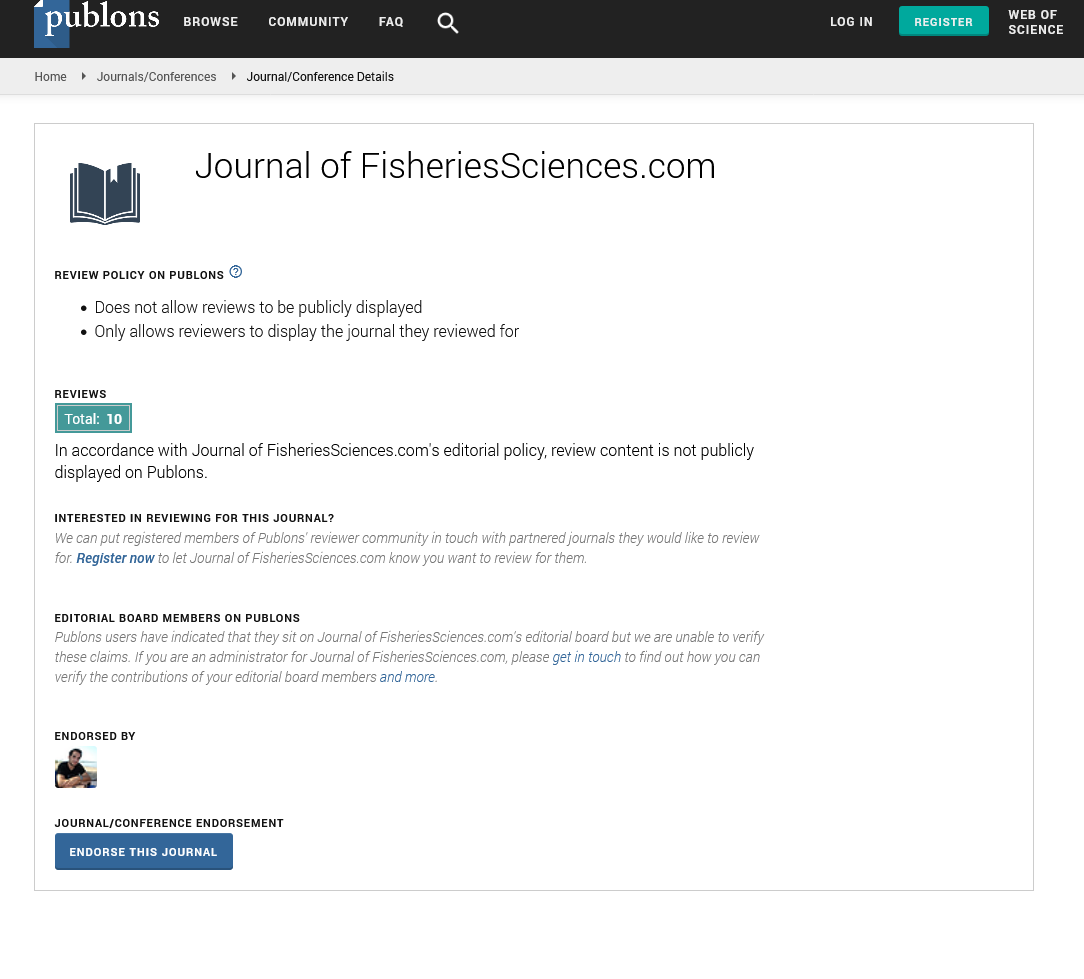Perspective - (2023) Volume 17, Issue 5
Navigating the waters of fisheries law: A sustainable approach to ocean conservation
Surjya Kumar Saikia*
Department of Aquaculture, Orissa University of Agriculture and Technology, Orissa, India
*Correspondence:
Surjya Kumar Saikia, Department of Aquaculture, Orissa University of Agriculture and Technology, Orissa,
India,
Email:
Received: 15-Sep-2023, Manuscript No. IPFS-23-14268;
Editor assigned: 20-Sep-2023, Pre QC No. IPFS-23-14268 (PQ);
Reviewed: 04-Oct-2023, QC No. IPFS-23-14268;
Revised: 19-Oct-2023, Manuscript No. IPFS-23-14268 (R);
Published:
27-Oct-2023
Introduction
The world's oceans cover more than 70% of our planet,
providing invaluable resources and serving as a critical
component of the global ecosystem. Among these
resources, fisheries play a pivotal role in sustaining human
livelihoods, food security, and the environment. However,
the unchecked exploitation of marine resources has led to
ecological imbalances and threats to the survival of many
marine species. In response to these challenges, fisheries
law has emerged as a crucial framework for the responsible
management and conservation of our oceans.
Description
The historical context of fisheries science
This article delves into the intricacies of fisheries law,
highlighting its key components, evolution, and the
importance of adopting a sustainable approach for the
future of our oceans.
The evolution of fisheries law
Fisheries law has a rich history that has evolved over
centuries to address the complex challenges of managing
and conserving marine resources. It has grown in response
to changing societal needs and ecological realities.
Early fisheries regulations
Early forms of fisheries regulations date back to ancient
civilizations, such as the Roman Empire and medieval
Europe. These regulations focused on issues like fishing
rights, property rights, and the preservation of fish stocks.
They were primarily concerned with sustaining local
communities' access to fish.
The modern era
In the late 19th and early 20th centuries, as industrialization
and technology advanced, the exploitation of marine
resources intensified. Overfishing became a global concern,
necessitating the development of international regulations.
The United Nations Convention on the Law
of the Sea (UNCLOS)
One of the most significant milestones in the evolution of
fisheries law was the United Nations Convention on the
Law of the Sea (UNCLOS), adopted in 1982. UNCLOS
introduced the concept of exclusive economic zones (EEZs) and territorial waters, providing coastal states with
sovereign rights and responsibilities over marine resources
within their zones. This marked a pivotal shift toward
the management of fisheries resources on a regional and
international level.
Key components of fisheries law
Fisheries law is a multi-faceted field that encompasses a
wide range of legal instruments, principles, and institutions.
Here are some of its key components:
Territorial waters and Exclusive Economic Zones
(EEZs): UNCLOS established the framework for states'
sovereignty and jurisdiction over their territorial waters
and EEZs. Territorial waters extend 12 nautical miles from
the coast, while EEZs can extend up to 200 nautical miles.
These zones grant coastal states the right to regulate and
manage the exploitation of fisheries resources within their
boundaries.
Regional Fisheries Management Organizations (RFMOs): To address transboundary fisheries issues, many states have
formed RFMOs. These organizations facilitate cooperation
among states in managing and conserving shared fish
stocks. Examples include the International Commission
for the Conservation of Atlantic Tunas (ICCAT) and the
Northwest Atlantic Fisheries Organization (NAFO).
Conservation and management measures: Fisheries
law includes a variety of conservation and management
measures, such as catch limits, gear restrictions, and closed
areas. These measures are designed to ensure the sustainable
use of fisheries resources and protect vulnerable species.
Compliance and enforcement: Effective fisheries
management relies on compliance and enforcement
mechanisms. These mechanisms can include Vessel
Monitoring Systems (VMS), observers on fishing vessels,
and penalties for illegal fishing activities.
The importance of sustainable fisheries management: Sustainable fisheries management is at the heart of modern
fisheries law, and for good reason. It is crucial to maintain
the ecological balance of marine ecosystems, ensure food
security for billions of people, and support the livelihoods
of countless fishing communities. Here are some key
reasons why sustainability is paramount:
Ecological preservation: Overfishing and destructive
fishing practices can lead to the depletion of fish stocks,
damage to marine habitats, and the collapse of ecosystems.
Sustainable fisheries management aims to prevent these
ecological catastrophes and preserve biodiversity.
Economic stability: The fishing industry is a significant
source of income and employment in many countries. By
implementing sustainable practices, nations can maintain
the long-term viability of their fisheries, ensuring economic
stability and the well-being of fishing communities.
Food security: Fish is a vital source of protein for millions
of people worldwide. Sustainable fisheries management
helps ensure a consistent supply of fish for
consumption, contributing to global food security.
Climate change resilience: Marine ecosystems also play a
role in mitigating climate change. Healthy oceans
sequester carbon, regulate temperatures, and support
resilient ecosystems. Sustainable fisheries management
can help protect these crucial ecosystem services.
Challenges in implementing fisheries law: While
fisheries law has made significant progress in recent
decades, it still faces several challenges that hinder its
effective implementation:
Illegal, Unreported, and Unregulated (IUU)
fishing: IUU fishing remains a pervasive problem,
contributing to overfishing and undermining
conservation efforts. Combatting IUU fishing requires
enhanced international cooperation, stricter enforcement
measures, and increased transparency in the industry.
Climate change: Climate change is altering marine
ecosystems, impacting fish distribution and abundance.
Fisheries law must adapt to these changing conditions and
integrate climate resilience into management strategies.
Stakeholder conflicts: Managing fisheries often involves
balancing the interests of various stakeholders, including
commercial fishermen, recreational anglers, indigenous
communities, and conservation organizations. These
conflicting interests can complicate the development and
enforcement of effective fisheries regulations.
Capacity building: Many developing countries lack the
resources and expertise to effectively manage and regulate
their fisheries. International cooperation and capacity-building
initiatives are crucial to address this issue.
Data deficiency: Accurate and up-to-date data is essential
for making informed decisions in fisheries management.
Many regions suffer from data deficiencies, making it
challenging to develop effective regulations.
Future directions for fisheries law: To ensure the
sustainable management and conservation of fisheries
resources, several directions can be pursued within the field
of fisheries law:
Strengthening international cooperation: Enhanced
cooperation among nations is critical to address
transboundary issues, such as migratory fish stocks and
IUU fishing. States should work together to harmonize
regulations, share information, and combat illegal activities.
Embracing technology: Advancements in technology,
including satellite monitoring, artificial intelligence,
and blockchain, can greatly enhance the monitoring and
enforcement of fisheries regulations.
Promoting sustainable aquaculture: As global demand
for seafood continues to rise, sustainable aquaculture can
help alleviate pressure on wild fish stocks. Regulations
should support responsible aquaculture practices.
Protecting vulnerable ecosystems: Efforts to protect and
conserve vulnerable marine ecosystems, such as coral reefs
and seamounts, should be integrated into fisheries law.
Empowering local communities: Fisheries law should
ensure the active participation and empowerment of local
communities in decision-making processes, recognizing
their traditional knowledge and sustainable practices.
Conclusion
Fisheries law stands at the crossroads of economic,
ecological, and social interests. Balancing these interests is
an ongoing challenge, but it is crucial for the long-term
well-being of our oceans and the millions of people who
depend on them. By adopting a sustainable approach,
strengthening international cooperation, and embracing
technological advancements, we can navigate the complex
waters of fisheries law to preserve our marine resources for
generations to come.






